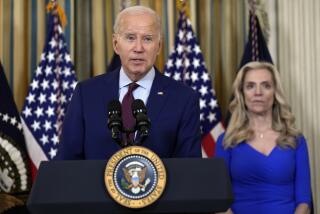Work begins on merger of financial regulatory overhaul bills
- Share via
Reporting from Washington —House and Senate lawmakers faced off Thursday to begin reconciling two major financial regulatory overhaul bills aimed at preventing a repeat of the crisis that cost taxpayers billions in federal bailouts.
Each chamber narrowly passed legislation that would enact the most sweeping tightening of financial rules since the Great Depression. Both bills grant the government broad new powers which include creating an agency to protect consumers, allowing regulators to seize troubled firms whose collapse would threaten the economy, and imposing strict regulations on complex financial derivatives.
But there are key differences in how the bills deal with those issues. For example, the House version exempts auto dealers from oversight by the new consumer agency and the Senate bill forces large Wall Street banks to spin off their lucrative derivatives businesses.
A conference committee with 43 members of the House and Senate must resolve those issues in time to meet the White House goal of passage by July 4. The group held its first meeting Thursday.
Democrats and Republicans continued to differ sharply as they jockeyed for political advantage amid public anger over the financial crisis and government bailouts. The televised proceedings gave them a platform to debate the issue heading into November’s congressional elections.
“Feelings of anger, frustration and rage justifiably hang over this proceeding because of the recklessness of financial whiz kids, the greediness of Wall Street bankers, and the shortsightedness of our economic regulators,” said Rep. Paul Kanjorski (D-Penn.). “Congress must respond by fundamentally changing the way that Wall Street operates.”
Republicans contend that some of the proposed regulations give Washington too much power over the economy while failing to address issues such as the future of troubled mortgage giants Fannie Mae and Freddie Mac, which were seized by federal regulators in 2008.
“The American economy will once again become the laboratory for another grand Democrat experiment in big government and central management,” said Sen. Richard Shelby (R-Ala.). “I am afraid that our economy’s prognosis is not good unless significant changes are made to this bill.”
Senate Banking Committee Chairman Christopher J. Dodd (D-Conn.) said his colleagues were determined to withstand what he called a “last-minute lobbying blitz” by the financial industry to water it down.
“This bill, made so strong over the course of the last year, will not be weakened in the last throes of the debate,” Dodd vowed.
Although formal proposals will be offered and votes taken in public sessions, much of the decision-making, and deal-making, will take place behind closed doors as House and Senate Democrats hammer out changes.
Congress in recent years has shunned formal conference committees in favor of backroom, ad hoc negotiations that provide more flexibility and less scrutiny. But cracking down on Wall Street is popular with the electorate. And with enough Republican support in the Senate to avoid a filibuster, congressional Democratic leaders opted for a public conference committee process. C-SPAN broadcast Thursday’s meeting and has committed to air all the open sessions.
Still, Republicans said Democrats were already maneuvering behind the scenes. They complained that Democratic leaders added 300 pages to the Senate bill without marking the changes and delivered the new 1,974-page product just a couple of hours before Thursday’s conference committee session.
“It appears, at this point, that the only facet of this conference that will be public is when the Republicans get our one and only chance to amend what has already been decided by our Democrat colleagues behind closed doors,” Shelby said.
The conferees elected House Financial Services Committee Chairman Barney Frank (D-Mass.) as chairman and he promised that no changes would be made to the bill that are not openly debated and voted on by the conference committee.
The U.S. Chamber of Commerce, which has led the charge against the proposal to create an agency to protect consumers in the financial marketplace, plans to launch an online effort to get businesses to highlight for targeted lawmakers the legislation’s impact on creating jobs and obtaining credit.
Meanwhile, Americans for Financial Reform, a coalition of labor, consumer, civil rights and liberal activist groups, had Nobel Prize-winning economist Joseph Stiglitz brief reporters this week on the need for tough new regulation of complex financial derivatives.
More to Read
Sign up for Essential California
The most important California stories and recommendations in your inbox every morning.
You may occasionally receive promotional content from the Los Angeles Times.














